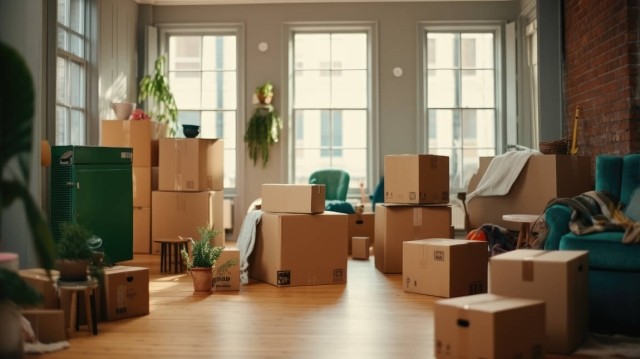Moving into a new apartment is exciting! How's that moving checklist coming along? You probably still have a few things to do before moving day, but you might want to add “set up utilities” to your to-dos. Setting up utilities in your apartment should be high priority, as they’re essential for a comfortable living space.
But maybe you aren’t looking to set up, and instead, are looking to transfer your utilities from one apartment to the next. Either way, we've got you covered.
Types of Apartment Utilities
While some apartments offer utilities as an amenity, others give tenants the ability to choose their own providers. This allows residents to pick their plans based on the criteria that's important to them, such as price and length of contract. These are the types of utilities you may need when moving apartments:
● Water/Sewer
● Electricity
● Natural Gas
● Trash
● Internet
● Security System
Some apartments and appliances may solely run on electricity, making natural gas an irrelevant household item (at least for your new living situation). Your apartment community might even wrap water, sewer, and trash into one flat fee that you pay on top of your monthly rent. Make sure you understand your lease, what responsibilities you have as a renter, and the utilities required (and their costs) for your new home.
What is an all-bills-paid apartment?
In some cases, you may find a unit that is known as an all-bills-paid apartment, which means that as the tenant, you pay a flat rate for the rent, and the landlord is responsible for paying all the basic utility costs. This depends on the landlord, but some may choose to only pay for the basics like electricity, gas, water, trash, and sewage. Others may choose to pay for all utilities, including internet and cable. Although only paying one bill to the landlord each month will be much simpler, that one bill will likely be substantial because of everything included in the rent price.
Are utilities always included in the rent?
There are many utilities-included apartments, which is a similar way of saying an all-bills-paid apartment. The utilities that landlords pay versus the utilities that tenants pay vary by apartment. You may find a unit that includes water, trash, and sewage in the cost of rent (perhaps at a flat rate), but the property manager or landlord requires the tenant(s) to set up the other utilities like electricity, gas, internet, and cable on their own. In another scenario, you may find an apartment that requires you to set up all utilities separately in your own name. It entirely depends on the property manager or landlord, so be sure to ask which utilities (if any) are included with the rent before you sign a lease.
Utility Setup Checklist
Research Utility Providers (4 weeks before move)
If you can choose your own providers, start researching companies that serve your area. Online research can help you find the best rates, plans, and coverage. While one provider may offer a better deal, another provider may have more coverage in your specific area. For instance, one internet and cable company may offer you a great discount, but another internet and cable company has better reach in that area.
Determine Your Move-In Date (4 weeks before move)
Once you’ve found a service provider for each utility not already provided by the property manager or landlord, you’ll need to determine your move-in date so your utilities are activated by the time your lease starts. If any utilities are included in your rent, such as water, then that utility will already been set up and ready to go on move-in day.
Contact Current Providers (3 weeks before move)
If you’re moving locally, reach out to your current utility providers to transfer or cancel services. Many companies allow you to do this easily online or through mobile apps.
Set up New Accounts (3 weeks before move)
For new services, create accounts with your chose providers. Be prepared with necessary information like your move-in date, identification, and payment method.
Schedule Service Start Dates (2 weeks before move)
Set service activation dates for your utilities to ensure everything is up and running before or on your move-in day. For internet connections, book technician appointments early as spots may fill up quickly.
Test Utilities Upon Moving In (move-in day)
Once you move in, check all your utilities to confirm they’re functioning properly. This includes internet speeds, electricity, water flow, and heating and cooling systems.
How to Set Up...
Water/Sewer
An account for water and sewage will need to be set up if it’s not already included in your rent. You can do this online at the city or county government’s website. They’ll let you know when your service and meter tracking begins, and when you can expect your first bill. Schedule this service at least two weeks before moving in.
Electricity
Getting set up with electricity should only take a few minutes. You’ll sign up for an energy plan online or over the phone, and your service could be ready in as little as one day, if necessary. Be sure to schedule it at least one week in advance, but again, most energy supply companies can have you up and running in less than 24 hours.
Natural Gas
If your appliances (stove, furnace, and water heater) run on natural gas, you're going to need a natural gas service provider to supply it to your apartment. A gas plan can be purchased online, but a technician may need to come to your home if it’s not already on. Schedule this service at least two weeks in advance in case a home appointment is needed.
Trash
Like most residential neighborhoods, your apartment community likely has a preferred supplier for trash pickup. Whether the service fee is included in rent or as a separate item, your property manager should handle the service set up. If you do have to set it up with the city or county, schedule trash service one week before you move in.
Internet
While internet-only plans are popular, bundling internet services with mobile plans or streaming platforms can be an attractive option due to the savings and convenience these offers provide. Check and see what’s available in your area before moving. For example, Fiber-optic connections are great if you work from home or spend a lot of time streaming or gaming, so you might want to take advantage of it if it’s available in your area. If you need installation, you might need the help of a technician. If so, schedule that visit at least two weeks in advance.
Security System
A security system will give you peace of mind in your home, and it can even lower the cost of your renter's insurance! If your home has a security system in place, you may just need to pay for the service if you choose to use it. If you don’t have one but would like to, you’ll have to buy the product and service. Schedule your security system installation one week prior to your move-in date.
When to Transfer Utilities or Switch Service Providers
If you're moving locally and already have accounts in your name, transferring them to your new address is easy. Most providers offer quick transfers online or through their mobile apps, often taking just a few minutes. If your current contracts are ending, switching providers could be a smart move to save money. Many companies now use AI-powered tools to help you compare rates and plans, making it easy to find the best deal. For those who prioritize sustainability, options like renewable energy plans or carbon-offset programs are becoming increasingly available and affordable.
When Your First Bill Arrives
Utility bills are often sent monthly with a due date on the invoice. It’s important to pay these on or before the date to avoid getting your services stopped due to non-payment. You can also change from a paper bill to paperless if you prefer this route.
You see, getting your utilities set up, transferred, and switched can be an easy process as long as you have a game plan and the right tips and tricks. Just make sure that you’ve turned off utility services at your old rental and that they’re turned on at your new apartment. And don’t forget to give the companies your unit number when you provide them with your home address!
This article was originally published on May 15, 2020.
FAQs
How do I transfer utilities to my new apartment?
To transfer utilities, contact your current providers and inform them of your new address and move-in date. This can often be done online or through mobile apps. Make sure to schedule service to end at your old address and begin at your new one to avoid interruptions.
What should I do if a utility isn’t working after I move in?
First, double-check with your provider to confirm activation. Test connections like electricity, internet, and water. If there’s still an issue, contact the utility company’s customer service for troubleshooting or to request a technician visit.
How can I find the best utility providers?
Research local providers using online comparison tools or AI-driven platforms. Look for competitive rates, service bundles, and customer reviews. Don’t forget to consider sustainable or renewable energy providers if that’s important to you.
How can I save money on utilities?
Bundle services like internet, streaming, and mobile plans to cut costs. Use energy-efficient appliances and consider off-peak hours for electricity use. Many providers now offer apps to monitor and manage energy consumption, helping you avoid wasting electricity or water.
What if I want to switch providers?
If your current utility contracts are ending, look into switching providers to get better rates or services. Use comparison tools to find the best deals, and always check cancellation policies before terminating existing contracts.
How do I get utilities for the first time?
If you’ve never had utilities in your name, contact your chosen providers to set up new accounts. You’ll need your new address, a valid ID, and possibly a deposit if you don’t have a credit history with the provider. Some services, like internet, may also require the purchase or rental of equipment.
How do you separate utilities when sharing an apartment with a roommate?
Decide on a fair division of utility responsibilities with your roommate upfront. For example, one person could handle electricity while the other handles internet. Make sure all bills are in the name of the responsible party or split the costs evenly.






